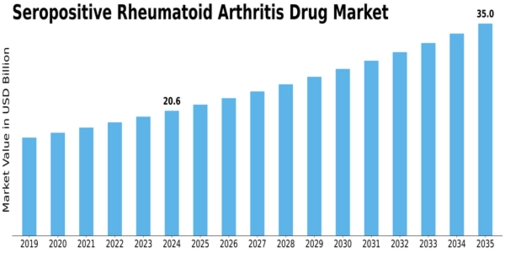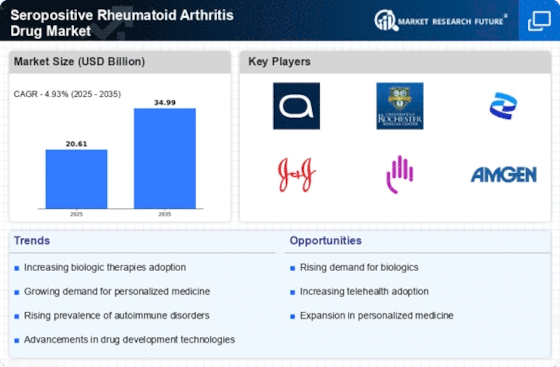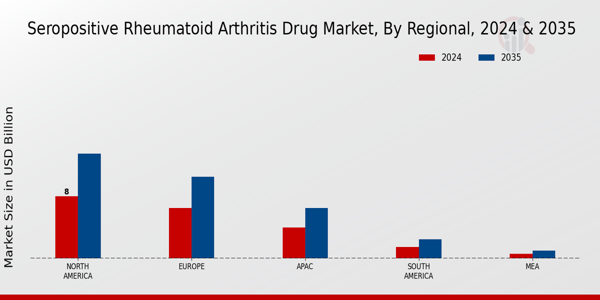Market Growth Projections
The Global Seropositive Rheumatoid Arthritis Drug Market Industry is projected to experience substantial growth over the next decade. With an estimated market value of 20.6 USD Billion in 2024, the industry is expected to expand significantly, reaching 35 USD Billion by 2035. This growth trajectory indicates a compound annual growth rate (CAGR) of 4.93% from 2025 to 2035. Such projections highlight the increasing demand for effective treatments and the ongoing advancements in drug development. The market's expansion reflects broader trends in healthcare, including the prioritization of chronic disease management and the need for innovative therapeutic solutions in the Global Seropositive Rheumatoid Arthritis Drug Market Industry.
Rising Healthcare Expenditure
The Global Seropositive Rheumatoid Arthritis Drug Market Industry is benefiting from rising healthcare expenditure across various regions. Governments and private sectors are investing more in healthcare infrastructure and services, which enhances access to advanced treatments for rheumatoid arthritis. This trend is particularly evident in developed nations, where healthcare budgets are expanding to accommodate the growing demand for chronic disease management. Increased funding for research and development also supports the introduction of novel therapies, further driving market growth. As healthcare expenditure continues to rise, it is anticipated that the Global Seropositive Rheumatoid Arthritis Drug Market Industry will experience sustained growth, aligning with the projected market value of 20.6 USD Billion in 2024.
Growing Awareness and Education
The Global Seropositive Rheumatoid Arthritis Drug Market Industry is also experiencing growth due to increased awareness and education regarding rheumatoid arthritis. Various organizations and healthcare providers are actively promoting knowledge about the disease, its symptoms, and available treatment options. This heightened awareness encourages early diagnosis and treatment, which can lead to better patient outcomes. As more individuals recognize the importance of managing rheumatoid arthritis effectively, the demand for specialized drugs is likely to rise. Consequently, this trend may contribute to the projected market growth, with expectations of reaching 35 USD Billion by 2035 in the Global Seropositive Rheumatoid Arthritis Drug Market Industry.
Advancements in Biologic Therapies
The Global Seropositive Rheumatoid Arthritis Drug Market Industry is significantly influenced by advancements in biologic therapies. These treatments, which target specific components of the immune system, have shown promising results in managing rheumatoid arthritis symptoms and improving patients' quality of life. The introduction of new biologics, such as monoclonal antibodies and fusion proteins, has expanded the treatment landscape. As these therapies gain regulatory approval and become more widely available, they are likely to contribute to the market's growth. The increasing adoption of biologic therapies may also lead to a compound annual growth rate (CAGR) of 4.93% from 2025 to 2035, reflecting the ongoing innovation in the Global Seropositive Rheumatoid Arthritis Drug Market Industry.
Regulatory Support for New Drug Approvals
The Global Seropositive Rheumatoid Arthritis Drug Market Industry is positively impacted by regulatory support for new drug approvals. Regulatory agencies are increasingly streamlining the approval process for innovative therapies, which facilitates quicker access to new treatments for patients. This supportive environment encourages pharmaceutical companies to invest in research and development, leading to the introduction of novel drugs that address unmet medical needs in rheumatoid arthritis management. As a result, the market is expected to benefit from a steady influx of new therapies, contributing to the anticipated CAGR of 4.93% from 2025 to 2035. This regulatory landscape is crucial for the ongoing evolution of the Global Seropositive Rheumatoid Arthritis Drug Market Industry.
Increasing Prevalence of Rheumatoid Arthritis
The Global Seropositive Rheumatoid Arthritis Drug Market Industry is experiencing growth due to the rising prevalence of rheumatoid arthritis worldwide. Current estimates suggest that approximately 1.3 million adults in the United States are affected by this autoimmune disorder. As the global population ages, the incidence of rheumatoid arthritis is likely to increase, leading to a higher demand for effective treatment options. This trend is expected to drive the market value to reach 20.6 USD Billion in 2024, with projections indicating a potential rise to 35 USD Billion by 2035. Such figures underscore the urgent need for innovative therapies in the Global Seropositive Rheumatoid Arthritis Drug Market Industry.



















Leave a Comment